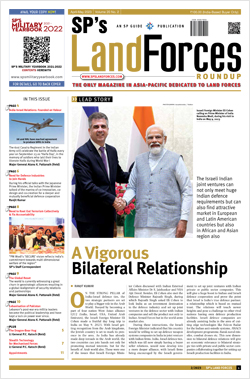INDIAN ARMED FORCES CHIEFS ON
OUR RELENTLESS AND FOCUSED PUBLISHING EFFORTS

SP Guide Publications puts forth a well compiled articulation of issues, pursuits and accomplishments of the Indian Army, over the years

I am confident that SP Guide Publications would continue to inform, inspire and influence.

My compliments to SP Guide Publications for informative and credible reportage on contemporary aerospace issues over the past six decades.
- Interim Defence Budget 2024-25 — An Analysis
- Union Defence budget 2024
- Indian Army: In quest of greater firepower and policy recommendations for gaps
- Indian Army Annual Press Conference 2024
- 6G will transform military-industrial applications
- Tata Boeing Aerospace Delivers 250 AH-64 Apache Fuselages, Manufactured in India
Employ Skillfully

At the two-day seminar on “Special Forces: Challenges and Opportunities,” organised by SP Guide Publications and CENJOWS on March 10 and 11, Air Chief Marshal P.V. Naik underlined the urgency of strengthening the Special Forces in the country as asymmetric warfare by transnational elements is on the rise.
The Term Special Forces (SF) has been explained in the Army Training Command Manual of “Fundamentals, Doctrines and Concepts of Indian Army”. The explanation reads, “SF is a body of highly trained specialised troops, suitably equipped with a capacity to operate across all levels of conflict. These troops are selected, trained, equipped and organised to operate in hostile territory, isolated from the main combat forces. They can be inserted by land, sea and air and operate in hostile environment to accomplish the assigned special missions. They may act discretely at strategic level, but more often operate in concert with other forces and agencies at the operational and tactical levels.”
The manual goes on to explain that when Special Forces operate with the main combat forces, they are best employed in support of the main effort either to enable main forces to achieve a decision or to extend the capability of these forces and hence SF should be considered as a force multiplier rather than a decisive force in itself.
Operations by SF are invariably joint operations, with the involvement of the Air Force and the navy, in specific forces. Joint activity expands the scope and complexity of operations.
The SF of the Indian Army with their present organisational structure, training, equipment, are designed to carry out a limited number of roles and tasks. In essence, they are being employed as ‘elite infantry’ or ‘super-infantry’ units. While their ability to conduct direct action, attrition oriented offensive operations such as raids, ambushes and surprise assaults is admirable as well as trustworthy, they are neither organised nor trained nor equipped for a variety of other tasks assigned in special operations, which they may be required to undertake in future. This may include partisan warfare, espionage, special reconnaissance, sabotage, psychological operations, civil affairs, counter nuclear proliferation and terrorists with weapons of mass destruction (WMD), sensitive politico-military operations and other strategic and operational level tasks which require a wide range of skills and a different organisational pattern with equipment and skilled personnel to complement the variety of additional tasks that they may be required to undertake.
International Seminar
A two-day seminar on “Special Forces: Challenges and Opportunities” was organised jointly by SP Guide Publications and the Centre for Joint Warfare Studies (CENJOWS), a think tank of headquarters Integrated Defence Staff of the Ministry of Defence, on March 10 and 11 in new Delhi.
The major outcome of the seminar was that a national vision is imperative with regard to the structuring, employment and deployment of the Special Forces in the country and the Indian model had to be its own based on our strategic needs and the operational environment currently and in the future.
Considering the number of roles they would be required to perform in the future, some felt that the current strength would have to be increased substantially and their skills upgraded to match the requirements. Another option for improving their effectiveness and efficiency is to organise all SF of the Army, navy and the IAF under a Special Operations Command, headed by a Commander-in-Chief (Army Commander status) for equipping, training, preparing and launching special operations. Such a structure would increase India’s strategic flexibility and options for dealing with future settings.
Differences Between Special and Conventional Operations
A wider understanding of Special Forces Operations requires a person to understand the differences between special operations and conventional operations. Some key differences are as under:
- Special operations can be described as para political. The ultimate objective is political and the political stakes and risks are frequently very high. They will generally not involve a declared state of war. They represent diplomacy conducted by other means and are subject to strict political or military control at the highest levels.
- They are frequently described as unorthodox or unconventional. however, the distinction between special and conventional military operations becomes less clear as the tempo of conflict approaches general war and the military component of the conflict increases. yet even in conventional war, special operations remain qualitatively different, by virtue of the scale, sensitivity and potentially decisive nature of the mission and the specialised nature of the assigned forces.
- Special operations are usually covert or clandestine. To ensure that they remain so, they are frequently small scale and limited in objective. Economy of force is the operative principle.
- Successful special operations are characterised by simplicity, enhanced by innovation, imagination and subtlety. Some may be direct but most follow the strategy of “indirect approach”. They rely on skill, speed, flexibility and deception.
- They may involve use of violence but such use of violence is selective.
- Military or civil personnel may be employed on special operations. They may come from the initiating country or they may be recruited elsewhere. They may be acting legally, extra-legally or illegally in the target country.
- These operations require intelligence assets and support of the highest quality.





